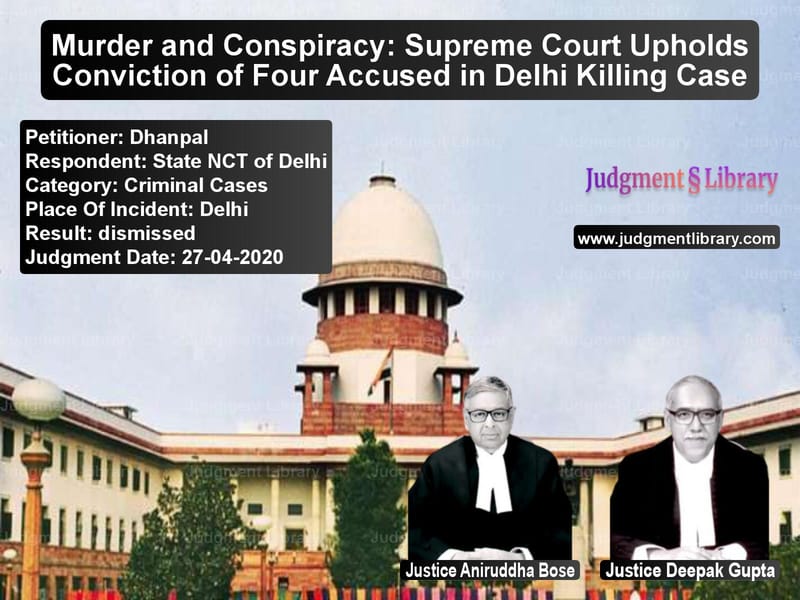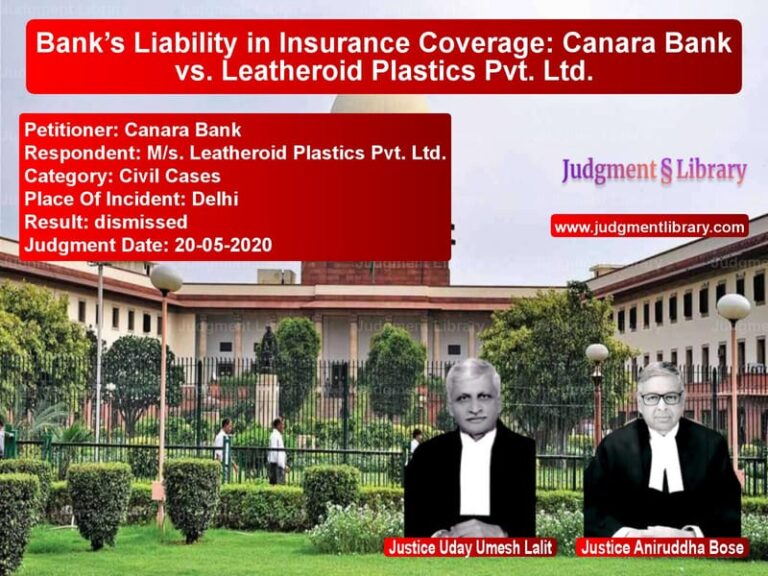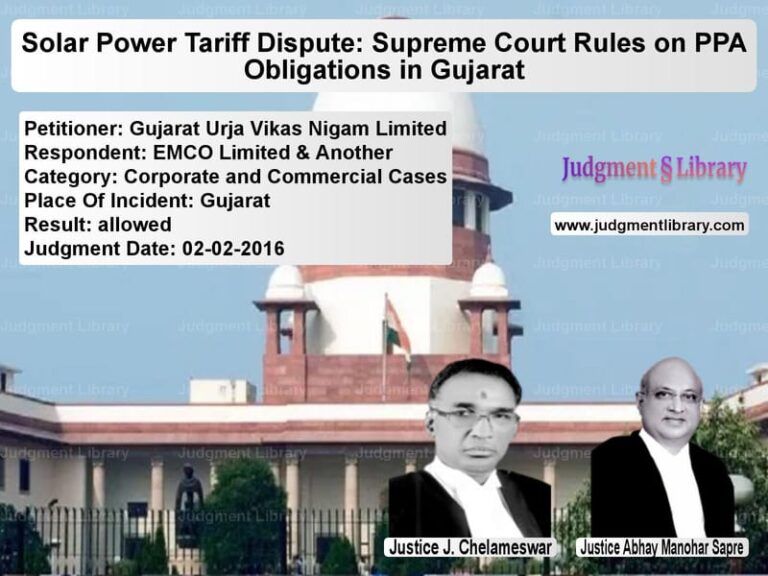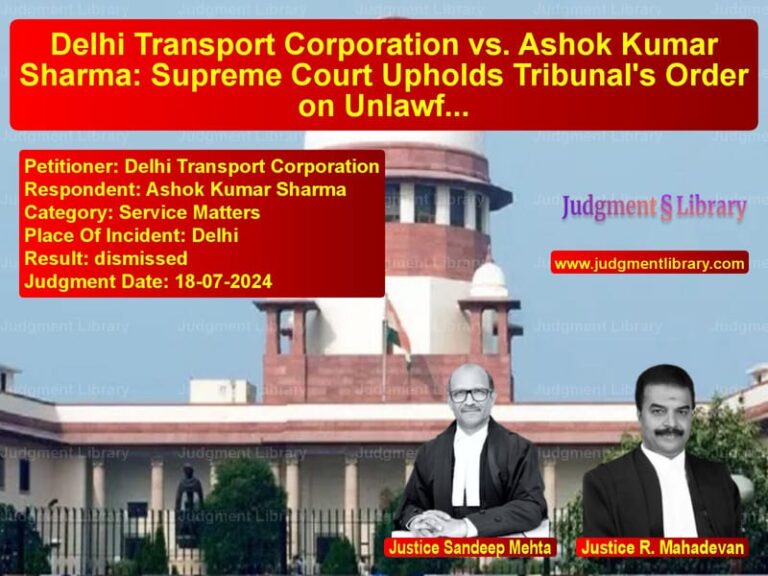Murder and Conspiracy: Supreme Court Upholds Conviction of Four Accused in Delhi Killing Case
The case of Dhanpal vs. State NCT of Delhi revolves around a murder that occurred on the evening of 9th August 1996. The incident resulted in the tragic death of Ajay Kumar Sharma, who was stabbed multiple times by a group of individuals after a verbal altercation. The Supreme Court reviewed the convictions of four accused individuals, including Dhanpal, Sant Ram, Sanjeev, and Kamal, who were convicted for the murder under Section 302/34 of the Indian Penal Code (IPC) by the trial court. The case raised crucial issues regarding the nature of the assault, the evidence presented, and the role of each accused in the crime.
Background of the Case
The incident occurred after a traffic accident involving Sanjeev, one of the accused, who collided with a cycle cart belonging to Sanjay. The altercation between Sanjeev and Sanjay escalated when Sant Ram, another accused, intervened. After a brief respite, the accused returned to the scene, accompanied by Kamal and Dhanpal, and attacked the deceased, Ajay Kumar Sharma, who had arrived at the location in the midst of the dispute. The witnesses, Sanjay, Narender Kumar, and Sobha Ram, testified about the brutal assault, where Kamal stabbed Ajay multiple times. The assault was witnessed by several individuals, and Ajay was later declared dead at the hospital.
Petitioner’s Arguments (Dhanpal, Sant Ram, and Sanjeev)
The appellants argued that they were wrongly convicted and contested the findings of the trial court and the High Court. Their arguments were:
- “There was no evidence to prove the appellants’ involvement in the attack on Ajay. We had no intention to kill him, and the incident was the result of a sudden altercation.”
- “The role of Kamal, who inflicted the fatal injuries, was overstated. We did not possess any weapons, and our actions were part of a scuffle, not a premeditated murder.”
- “The testimonies of the prosecution witnesses, being related to the deceased, should be scrutinized with caution as they may be biased.”
- “The trial court failed to properly evaluate the evidence, including the contradictions in the witness testimonies regarding the exhortation of Dhanpal.”
Respondent’s Arguments (State NCT of Delhi)
The State, represented by the prosecution, argued that the appellants were indeed guilty of the murder, and their involvement was clearly established through eyewitness testimony. The prosecution’s arguments included:
- “The appellants were clearly identified by multiple eyewitnesses at the scene of the crime. The evidence of Sanjay, Narender Kumar, and Sobha Ram consistently pointed to their involvement in the assault.”
- “The appellants, along with Kamal, attacked Ajay with premeditated intent. The use of weapons and the brutality of the assault demonstrate that the intention was to kill the victim.”
- “The appellants’ defense of unintentional involvement in the scuffle does not hold. They had prior knowledge of Kamal’s intentions to inflict harm on Ajay, and their actions were coordinated.”
- “The trial court correctly interpreted the evidence and concluded that the appellants had common intention, which is crucial in murder cases under Section 34 IPC.”
Supreme Court’s Observations
The Supreme Court examined the facts and arguments presented before it. The key observations of the Court were:
- “The assault was clearly premeditated, as evidenced by the fact that the appellants returned to the scene with Kamal, who carried a weapon, to execute the attack on Ajay.”
- “The presence of the appellants at the scene of the crime, their exhortation to kill Ajay, and their involvement in holding him down while Kamal inflicted the fatal blows, all point to a shared intention to commit murder.”
- “While there were minor discrepancies in the testimonies of the eyewitnesses, these discrepancies were not material enough to affect the overall credibility of their accounts. The core facts remained consistent.”
- “In cases of collective assault, the common intention to commit murder can be inferred from the actions of the group, even if not all members participated directly in inflicting the fatal injuries.”
The Court emphasized, “The common intention to commit a crime can be inferred from the actions of the individuals involved. The mere fact that not all the accused physically inflicted the fatal injuries does not absolve them of responsibility.”
Final Judgment
The Supreme Court upheld the conviction of the appellants and dismissed the appeals:
- The Court found that the appellants had a common intention to commit murder, which was substantiated by the evidence.
- It ruled that the convictions under Section 302/34 IPC were correctly imposed by the Trial Court and upheld by the High Court.
- The sentence of life imprisonment, along with a fine of Rs. 2,000, was also upheld, and the bail bonds of the appellants were canceled.
Implications of the Judgment
The ruling has significant implications for criminal law, particularly in cases involving collective assault and the concept of common intention:
- In collective assault cases, even if not all participants inflict fatal injuries, they may still be held responsible if there was common intention to commit murder.
- Eyewitness testimony remains crucial in establishing guilt, but courts must assess the credibility of such testimony, especially when witnesses are related to the victim.
- The judgment reinforces the importance of understanding the concept of ‘common intention’ in the commission of crimes, particularly in murder cases under Section 34 IPC.
The judgment serves as a reminder that in cases of violent crime, all parties involved in the commission of the offense can be held accountable for the actions of the group, even if their individual involvement in the act of violence is limited.
Petitioner Name: Dhanpal.Respondent Name: State NCT of Delhi.Judgment By: Justice Aniruddha Bose, Justice Deepak Gupta.Place Of Incident: Delhi.Judgment Date: 27-04-2020.
Don’t miss out on the full details! Download the complete judgment in PDF format below and gain valuable insights instantly!
Download Judgment: Dhanpal vs State NCT of Delhi Supreme Court of India Judgment Dated 27-04-2020.pdf
Direct Downlaod Judgment: Direct downlaod this Judgment
See all petitions in Murder Cases
See all petitions in Bail and Anticipatory Bail
See all petitions in Criminal Defamation
See all petitions in Judgment by Aniruddha Bose
See all petitions in Judgment by Deepak Gupta
See all petitions in dismissed
See all petitions in supreme court of India judgments April 2020
See all petitions in 2020 judgments
See all posts in Criminal Cases Category
See all allowed petitions in Criminal Cases Category
See all Dismissed petitions in Criminal Cases Category
See all partially allowed petitions in Criminal Cases Category







